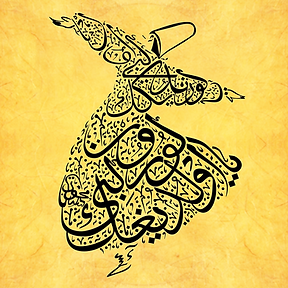
HIS WORKS
Mevlana ( ‘Our Master’) Jallaludin Rumi is an Islamic scholar, poet and mystic, who lived in the thirteenth century. Born in a village near Balkh, in present Turkmenistan, he fleed when he was six with his family for the Mongols to ultimately setlle in Konya, Turkey. There he worked and lived most of his life. One will find his mausoleum there, a sanctuary of great spiritual potency, where thousand of pilgrims of all religious shades and directions daily offer their prayers, venerations and hopes.
In his fourties he was called to follow the footsteps of his father, also a known mystic himself, after his death and became a religious teacher. A particular and personally unearthing event was his sudden meeting with a wandering derwish, Shams-i Tabriz. This encounter changed his life completely, as a transformative upside-down experience. It led and guided him to become a mystic himself. After the loss of this enigmatic spiritual friend, some years later, Mevlana Rumi was innerly compelled to exort his soul in now vast volumes of so beautiful and wise lyrical words and poems, the Diwani Shams-I Tabriz.
Somewhat later Mevlana Rumi ,with the help of his srcibes, set out to compose his epic and spiritual masterwork, the Mathnavi ( Spiritual Couplets). A series of stories, anecdotes, animal fables, Hadith and Quran-commentaries, which became the foremost volume of his didactic teaching. Of such a spiritual depth and wide, that it is now venerataely held and named as the Quran in Farsi ( the Persian language).
Both the Diwani Shams-I Tabriz and the Masnavi are seen as the most important parts of his legacy. There is still a third book ( of his preachings) in prose, Fihi ma Fihi ( Sings of the Unseen) which has been transmitted over time. And is the only text of Mevlana that is composed in prosa.
Mevlana Rumi died in the year 1273 in Konya, Turkey. For him his death was in such a clear way a reunion with his Beloved. A much longed for moment of mystical marriage. He summoned his family, friends and followers therefor not to mourn. He himself finally had reached his real home, his deep, umate spiritual destiny.

